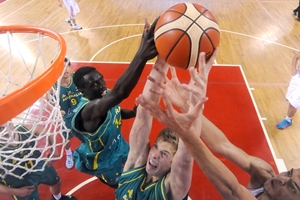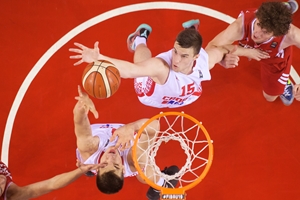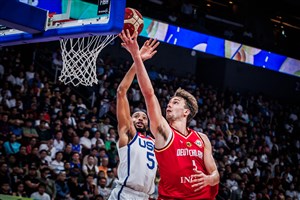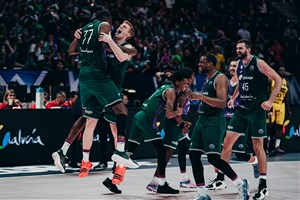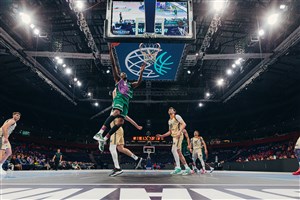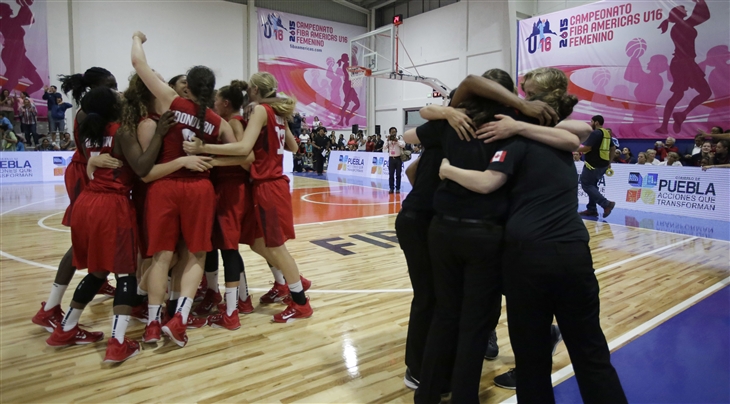
2015 FIBA Americas U16 Championships - the players I liked
SAN JUAN (William Rosario's Somewhere in the Americas) - It's now been a week since the FIBA Americas U16 Women's Championship concluded and there's enough separation for me to have perspective on the best talent that we saw in both the women and men editions this year in our continental landscape.
Both championships were a real proof of the growth, both inside and outside the court, of basketball in the different countries. Crowds were great in Bahia Blanca and Puebla, and there seems to finally be a conscious effort on the part of some federations to see this as their first step in the national team program process. That's huge and understandable for a competition that only had three previous editions under its belt, starting in 2009.
If there's one big takeaway from it all, and it’ll be reflected in the list below, is that Canada Basketball's work and attention to detail in their player development process is really starting to become effective both in the short term and for the future of their national team. They were always elite in this age group, but now they have arrived as a real rival to the ever-dominant USA.
So let's start with the women:
5. Nelly Rapalo (Honduras)
I'd heard some things about Nelly prior to the beginning of the competition, especially about how she single-handedly qualified Honduras to its first ever U16 continental, but this tournament confirmed it, she's the real thing. Still a little undersized for her point guard position, with a tendency to turned the ball over and take bad shots, Rapalo's dribbling ability and her basketball sense are impeccable and compensate for the fact that for this Honduras team, everything started and ended with her. Numbers: Led the championship in scoring with 22.2 points per game.
4. Obulanma Ugwu (Brazil)
A fighter, with a knack for knowing where she has to be at all times in the court. Even though she fell into some foul trouble in some games, the fundamentals are top-notch, especially in rebounding and finishing skills under the basket. Oh, and if there was a defensive MVP of the tournament, Ugwu would have been top candidate. Numbers: Averaged a double-double of 12.4 points and 11.6 rebounds per game.
3. Hailey Brown (Canada)
There wasn't anybody in Puebla with a better shooting form than Brown. A player that does not have higher scoring numbers because of the fact that she's so fundamentally sound that a bad shot is not in her toolkit. Brown is one of those players that at 16 you can see has a long career ahead of her as both a professional and in the national team. Great upside. Numbers: Is in the process of building a nice international curriculum (this is her second FIBA Americas U16, having already played the FIBA U17 Women's World Championship last year.)
2. Alyssa Jerome (Canada)
The MVP of the championship stood out in a very talented Canada team. Her poise was key in the country's title run. A great leader, and clutch, with a very nice touch from long range. She's tall, athletic and a player that will be heard from for years to come in Canada’s national team program. Numbers: Led Canada in both scoring and rebounding with 13.2 points and 9.2 rebounds per game.
1. Izabela Nicoletti (Brazil)
I tend to be hyperbolic, but in my opinion I've never seen a more exciting basketball player in this age group than Nicoletti - women or men. What she did in this championship was incredible, Stephen-Curry-in-the-NBA-this-past-season like incredible. Her performances against the USA (a team that was defeated for the first time in the history of the competition) and Canada in a losing effort, were can't miss. She can do everything as a point guard, organize your offense and be a scorer in every which way possible, as a shooter or driving the basket, with great effectiveness. Numbers: 24 points, 7 rebounds and 5 assists against the USA; 32 points, 7 rebounds and 5 assists against Canada in the Final.
Honorable Mentions: Alexis Morris (USA), Danna Grenald (Honduras), Eliannis Armentero (Cuba), Clarissa Fernandes (Brazil), Andra Espinoza-Hunter (USA)
Now let's take a look at the men:
5. Eric Ayala (Puerto Rico)
This kid showed a bit of everything in Bahia Blanca. His offensive skills are on point. He can shoot from long distance, drive and is deadly on the fastbreak. With a 6ft 3in (1.91m) frame, and a style that fits perfectly in the scoring-first philosophy that Puerto Rico has on the perimeter, Ayala can be an interesting prospect moving forward. Numbers: Led the championship in scoring with 19.6 points per game.
4. Alanzo Frink (Dominican Republic)
Frink is young even for this age group (just turned 15), but has very interesting skills that have to be put on close watch by the Dominicana national team program. He will end up as a power forward that can shoot, he likes to have the ball in his hands in the big moment and is not afraid to bang in the paint. Numbers: Led Dominican Republic in both scoring and rebounding with 18.0 points and 7.2 rebounds per game.
3. Oluwasimisola Shittu (Canada)
Shittu's performance against USA in the Final alone is enough to have him as a top prospect. In that game he showed his shot-blocking ability, a great sense for offensive rebounding and his versatility on offense. Numbers: 18 points, 14 rebounds, 3 blocked shots and 6 steals in the Final against USA.
2. Gary Trent Jr. (USA)
The most confident player I saw in both tournaments. One of those athletes that oozes the "I know I'm the best player here" vibe. He's a streak three-point shooter, with an incredible athletic ability and great fundamentals. Seems ready to contribute at any NCAA college team right now, and he's only 16. Numbers: His seven three-pointers against the Dominican Republic tied the record previously held by Bradley Beal in the competition.
1. Danilo Djuricic (Canada)
When we look back at this championship, there might be some players not mentioned in this list that might end up with better careers, but in this FIBA Americas U16 Men's Championship, Djuricic was my favorite player to watch. He played hard every possession and was the most fundamentally sound player I saw in both competitions. His three-point shot form is great and his willingness to fight in the paint for rebounds is outstanding. I can see Djuricic having an impact in Canada's national team program in the near future. Still has room to grow, but is well in his way to an interesting career. Numbers: Shot 46 percent from three-point range, averaged 12.2 points and 9.2 rebound in the championship.
Honorable mentions: Lautaro Lopez (Argentina), Salvador Martinez (Mexico), Rowan Barrett Jr. (Canada), Wendell Carter Jr. (USA), Jarred Vanderbilt (USA)
William Rosario
FIBA
FIBA's columnists write on a wide range of topics relating to basketball that are of interest to them. The opinions they express are their own and in no way reflect those of FIBA.
FIBA takes no responsibility and gives no guarantees, warranties or representations, implied or otherwise, for the content or accuracy of the content and opinion expressed in the above article.

